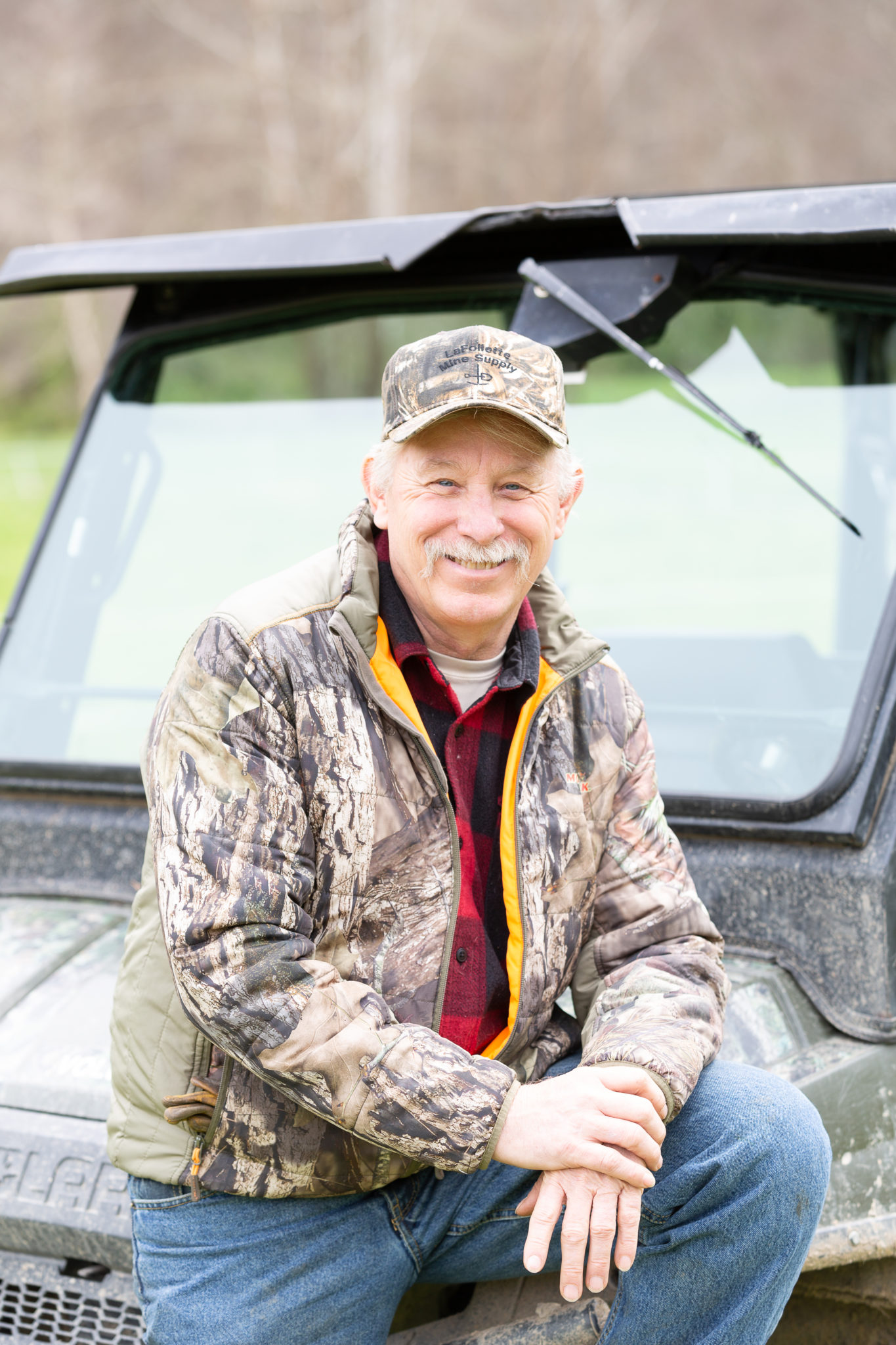Terry’s company office bears the hallmarks of a busy person who knows how to unwind: Working papers on the desk; photographs and awards carefully placed; a giant rack of elk antlers on the wall. He’s the owner of Real-Time Construction in Knoxville and spends his weekdays working on various construction projects. Hotels, churches, homes… You name it: He’s worked on it. “We’re pretty flexible,” he says. Terry Lewis and his wife, Jane, grew up together in Southern Illinois. They met in grammar school, remained friends throughout their young lives, and have been married for 46 years. They married right before Terry left for Japan, during the Vietnam War.
He joined the US Air Force in 1971, during the draft. “The civil service person lived directly across the street from me.” He smiles. “My class had 100 males graduating. My draft number was 18, so I knew I’d be drafted, it might as well have been number one, so I went ahead and signed up, rather than waiting. I knew I could get a tool belt rather than a gun.” Terry boot-camped at Lackland AFB in Texas and trained at Chanute AFB in Illinois. After he and Jane got married in April, 1972, he was sent to war base camp at Beale AFB in California for deployment to Kadena AFB on Okinawa, Japan.

The hostilities in Vietnam and most of Southeast Asia were in full swing when Terry arrived on Okinawa. “I had a tool bag. I was on the ground working seven days a week, 12 hours a day. They were flying bombing missions over Hanoi and the Ho Chi Minh Trail and we were working on the re-fuelers. The tankers were stationed at Kadena. I was doing heating, air conditioning, and pressurization, which is called Environmental Systems.” Terry remained at Kadena until he was out of the Air Force in 1973 and he’s glad he never saw combat. “I did my job. When you look at the big picture, you’re protecting America and it’s more than one person, it’s more than a guy with a gun. Somebody has to keep the planes flying, keep the boats floating, feed the troops… Everybody’s got a job to do. I don’t regret not seeing combat at all.”
Terry brought his newfound mechanical skills and an expertise in organization home to Illinois. He and Jane moved in with family for a couple of months while he worked in plumbing, heating, and air conditioning. “I got a lot of training and I got a molding of my personalities, I guess you could say. I was taught line-item authority; you answer to the next person in authority and you do what they tell you to do or there are serious repercussions. You know they cut off everyone’s hair, so that everyone’s alike. They take away who you are and then they give it back to you, in a different way.” Though the training he’d received on base didn’t directly apply to residential HVAC work, Terry’s organizational skills, experience in a chain of command, and respect for authority lent themselves to the serious work ethic required to run a business. A small general contractor gave Terry an opportunity to play various roles on construction projects and to learn anything he could about construction. “I’ve done just about everything you can do in this industry.”
Those are the weekdays. The Lewis weekends are another story entirely.
A Special Place in the Mountains
“I like to ride dirt bikes. We moved down here because of dirt bikes.” Terry learned to ride in the Air Force. “In Illinois, it’s farmland, it’s flat. You can go fast for a long way, but there’s no challenge to it.” In 1978, he came to Tennessee to visit an Air Force buddy who lived here and they biked in Campbell County, at what is now Royal Blue ATV Resort. That trip changed the direction of Terry and Jane’s lives. “The riding was so spectacular and so big and endless, it was extremely challenging. I thought, ‘This is what I want to do.’” He made four or five trips back to Campbell County until 1980, when he and Jane and their two children moved to East Tennessee, permanently.
They wanted to buy a piece of land where they could camp and ride, and Terry says he was just looking through the paper one morning in 1993 when he came upon an ad for what sounded like the perfect spot. “For sale by owner. I called him up. He told me to go look at it. I paid him some go-see money. I got some partners together and we bought it and we still own it, after all these years. There’s three of us, now. There were five.” He and Jane own 750 acres of mountainous land, adjacent to the North Cumberland WMA and OHV Riding Area and they spend their weekends in their farmhouse; Terry doesn’t ride his dirt bike anymore, but he still spends lots of time out on the land. “When you go out our back gate, you have 150 thousand acres of public land. You can go out and camp, ride dirt bikes, go turkey hunting, go deer hunting… public land. It’s really nice, mountainous, scenic, remote, all the things that we enjoy.”
And they like to share this beautiful, private spot with others. Often. The events that they sponsor include hundreds of people who all come out to enjoy the outdoors and to take part or to support someone who’s taking part in the event. An example is the JAKES (Juniors Acquiring Knowledge, Ethics, and Sportsmanship) program started by the
National Wild Turkey Federation. Jakes are juvenile turkeys and the NWTF sponsors outreach events all over the US for young people. Terry is Vice President of the Pine Mountain Longbeards Chapter of the NWTF and the President of the Campbell Outdoor Recreation Association; it’s a natural fit for these events to take place on the property that he and Jane love to share. “Sometimes, we take kids turkey hunting. On JAKES Day, we take 225 kids fishing, sometimes more. Youths, from seven to sixteen [years of age]; we’ve been doing this eight, nine years? I don’t even know how long. We target kids who are disadvantaged: they may have a mom and no dad; they may have families that are not financially in a position to take their kids to do things.”
Terry hand-picks the guides who accompany the children around the property on the hunt. “They show up at four o’clock in the morning, we feed them, we pair them up with the guide that I’ve selected for them, we put them in a Polaris Ranger, we take them up on the mountain and put them in a blind with the adult who controls the firearm and the calls and the decoys. Last year, we had 12 kids and most of them had never been out in the woods before.” This year was the first year that the young people taking part in the event were able to stay the night on the property, along with family and friends. Terry has had cabins built and there are other camping areas and a bunkhouse, as well.
Another event is the award-winning, annual Wounded Warrior Ultimate Turkey Hunt (in its 14th iteration, this year), held on Terry’s property and a neighboring property belonging to Ron Cunningham. This experience is open to wounded veterans from Fort Campbell and all over East Tennessee and other disabled hunters of all ages. “We take 26 at a time, we split them up: Half are at Ron’s place, half are at ours. Most of them are wounded veterans, but the gap between the number of veterans and the full 26 is made up of disabled hunters, mostly kids. A lot of these guys are in wheelchairs: some have no arms, no legs. We do a meet-and-greet on Friday night, a fish-fry, we have music and fellowship, and nobody pays anything for the weekend because we get sponsors to support the events.” Sponsors include private donations and sponsorships, as well as help from the NWTF, the Rocky Mountain Elk Foundation, and the Tennessee Wildlife Resources Agency, to name but a few.
“By ten or eleven o’clock Friday night, most everybody’s in bed, because guess what? In about four hours, 0-early-thirty’s gonna happen to you.” About a hundred people participate in the hunt over the weekend, which include hunters, guides, and an all-important support staff of volunteers. “We’ve had people who had to be catheterized, in the field. All different afflictions, we’re ready for anything.” The logistics of an event like this cannot be overanalyzed and Terry takes that duty on, himself. “There’s a lot of thought that goes into teaming up the right guide with the right hunter. It takes the right kind of guide to spend the day with a guy who talks real loud instead of being calm in the blind and the guide might also have to help him go pee. There’s serious strategy that goes into who goes with
who and where they go and how hard is it to get that guy in his 400-pound power chair 700 feet up the mountain? It’s pretty complicated.” The end results remain the same, year after year: they put the wheelchair in the bed of the ranger, they get everyone mobilized, and they head out on the turkey hunt.
Lots of guides and volunteers return every year. “There’s a pretty large demand to be a guide, because it’s a pretty emotional event. There’s a lot of people who are adamant to be a guide; they want to give back.” Over the years, a diverse group of people have served as guides (Jared Effler, Tennessee District Attorney General for Campbell, Claiborne, Fentress, Scott, and Union counties is among a number of repeat guides) and Terry says he gets “a feel for their level of calmness and maturity”; after an event, he pretty much knows who will be coming back the next year. Terry says it’s a very nurturing environment and more people attend every year. “We’re blessed. I’m gonna knock on wood, here. It’s a joint effort among five major conservation organizations. It’s special.”
 “Hunters are conservationists.”
“Hunters are conservationists.”
Terry and Jane have both won numerous awards for the fundraisers and events they hold on their land, for their work in bringing elk to Tennessee, and in habitat enhancement projects, like the Hatfield Knob Elk Viewing Area. Elk were reintroduced to that part of Tennessee in 2000; Terry volunteered on trips transporting elk from Kentucky. As part of that reintroduction, Terry and Jane oversaw a project with the TWRA to clear an area of the North Cumberland Wildlife Management Area for a meadow, to plant crops for the wildlife, and to build a viewing tower. The tower on Hatfield Knob, built in 2005, stands at the heart of a 670,000-acre elk restoration zone that includes the NCWMA and is legendary among wildlife observers as a premium spot for viewing elk in Tennessee.
Terry loves working in conservation and he enjoys being around those who feel the same about the projects involved in that effort, such as Turkey Hunters Care and Hunters for the Hungry. Those organizations provide food boxes at the end of the year for people in the area who are going without meals. He and Jane are focused on and committed to sharing their love of the outdoors and to giving others part of what they have built in their lives. “Why would you not?”
